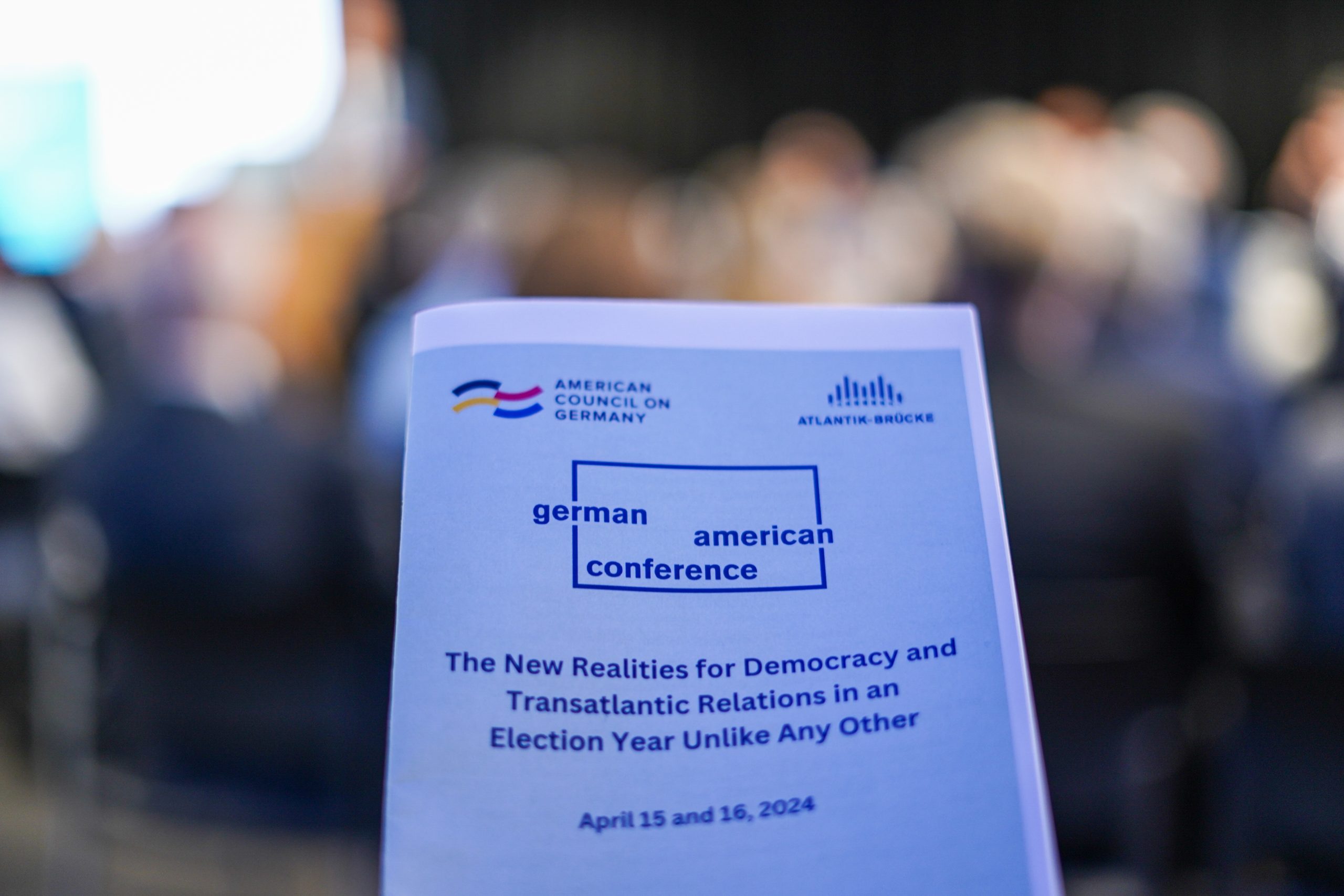
In 2024, more than sixty countries will hold a variety of elections. As half of the global population heads to the polls to vote, the results of these elections will have long-term implications for democratic institutions, values, and processes. Ongoing wars in Ukraine and the Israel-Hamas war in Gaza, as well as issues like political polarization, economic insecurity, and distrust in government form the backdrop of this pivotal year.
At this crucial moment, the American Council on Germany and Atlantik-Brücke convened their annual German-American conference in Washington D.C. on April 15 and 16, 2024 to explore what’s at stake and the role that the transatlantic relationship plays in this monumental year of elections.
Sigmar Gabriel, Chairman of Atlantik-Brücke, opened the conference by welcoming everyone back to Washington D.C. and highlighting the importance of 2024 as an election year. The upcoming EU Parliamentary elections, state elections in eastern Germany, and the U.S. Presidential election in November are only some of the elections that will take place this year. The right to vote lies at the core of the transatlantic relationship and these converging elections make 2024 a transformative election year with uncertain implications for the stability and order of the world. Mr. Gabriel stressed that there are three major declines that are currently ongoing. The first is global economic decline; the second is the ongoing violent conflicts and wars like in Ukraine and Gaza which create geopolitical decline; and the third is the perception of democratic decline and the notion that liberal democracies are in crisis.
Mr. Gabriel’s remarks were followed by a welcome by Axel Dittmann, Charge d’Affaires of the Embassy of the Federal Republic of Germany in Washington D.C. Mr. Dittmann said that the transatlantic relationship must be a driving factor behind strengthening NATO and the European defense pillar, fostering trade ties to enable working supply chains, and to nurture bilateral relations through people to people engagement. Close transatlantic ties and administrations are vital in the functioning of the world.
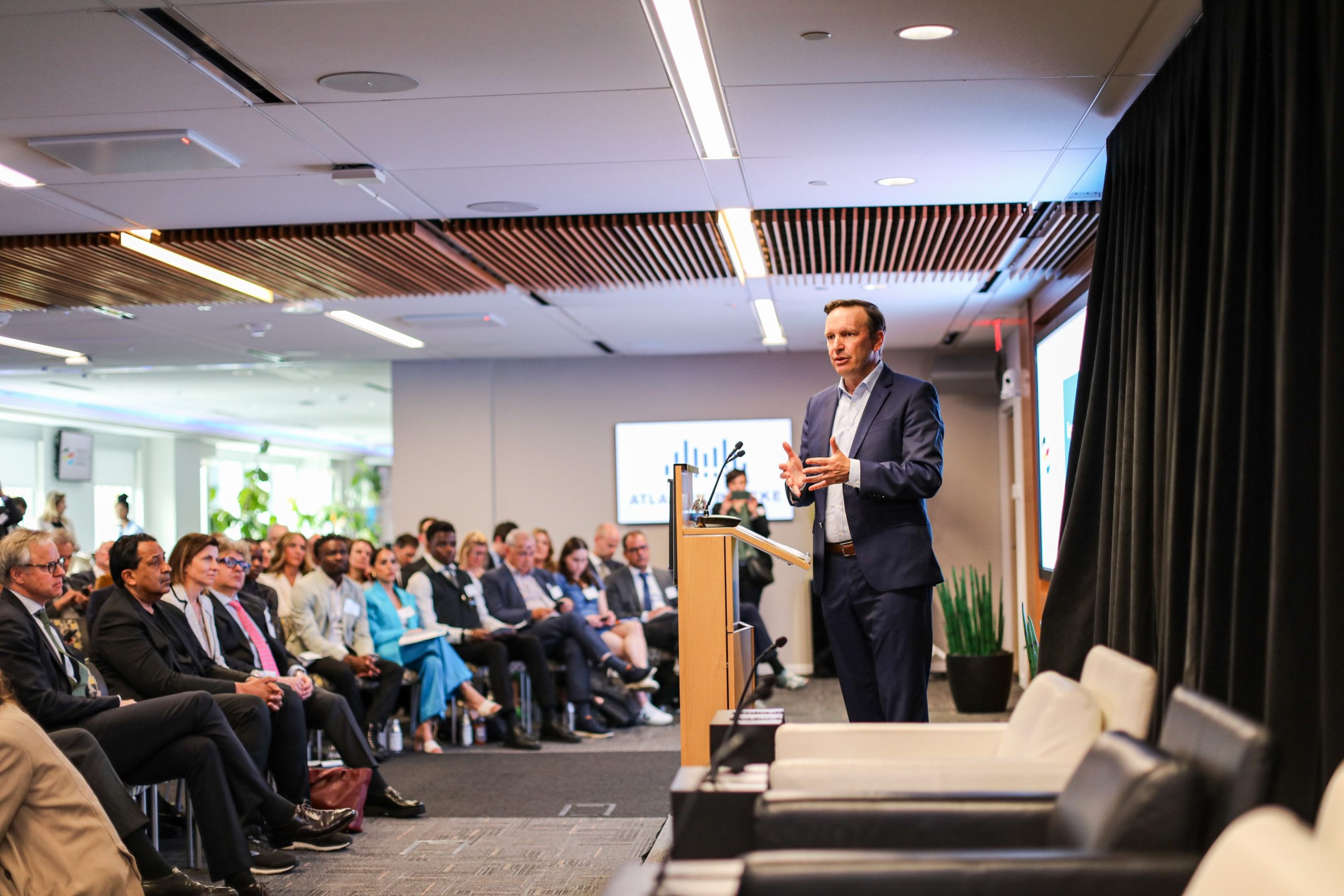
Senator Chris Murphy addresses the 2024 German-American Conference
In a keynote speech, Senator Christopher Murphy (D-CT) said that the German-American relationship is vital to the U.S.’ relationship with Europe. It is a cliché to talk about how dire of a moment we live in today given how many threats we face. Among other dynamics, democracies are growing more fragile, and China and Russia are on the march. He posed the question if we are going to meet these threats and work through them together or are we going to expend limited energy fighting with our allies instead? He underscored that there is strength in democracy, and we must do more to address issues together. For instance, the U.S. and Germany should thoughtfully decouple from China, not passionately and thoughtlessly. He added that China funds vanity projects in Africa and is increasingly expanding its global footprint. China’s global influence is something that should be closely and carefully monitored. Senator Murphy stressed that although American efforts to rebuild industrial manufacturing may cause global friction, 24 percent of the German economy is dedicated to manufacturing, while only 11 percent is dedicated in the U.S. He emphasized that the U.S. must rebuild these jobs because they are meaningful and necessary.
Following his remarks, in a fireside chat with Sigmar Gabriel, the two agreed that these are times of unique threats, but these threats require transatlantic coordination. For instance, Senator Murphy said that Europe and the U.S. should manage China in a way that does not destroy global security or economic stability. He noted that China is the “biggest challenge and opportunity” for the transatlantic relationship. Furthermore, while examining foreign policy, Senator Murphy added that the growing lack of support for the war in Ukraine stems from a history of distrust in the United States’ failed foreign policy operations abroad. Despite his anti-war stance, the war in Ukraine is just, and he supports the continuation of Ukrainian aid.
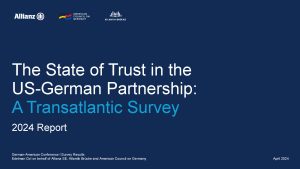 With the support of Allianz, the American Council on Germany and Atlantik-Brücke commissioned a survey entitled “The State of Trust in the US-German Partnership: A Transatlantic Survey.” The results were presented by Matt Cunningham, Executive Vice President of Edelman Data & Intelligence. The survey results indicate that trust has declined since 2022, down 18 percent among Germans and 5 percent among Americans. Trade, commerce, military, and defense are the main issues of the partnership. Among other issues, the growing lack of willingness to reach compromises and consensus, as well as media misinformation, are driving less trust on both sides. According to Germans, social inequality (67 percent) and the rise of extremism (63 percent) are the main drivers of division in the United States. Nearly 1 in 2 believe that the partnership is addressing issues that are personally relevant to them, but more transparency and collaboration on defense and economic security would drive further trust in the government with an overarching key focus of achieving both domestic and global improvements. That said, the partnership remains “strong and plays a crucial role in the world’s stability.”
With the support of Allianz, the American Council on Germany and Atlantik-Brücke commissioned a survey entitled “The State of Trust in the US-German Partnership: A Transatlantic Survey.” The results were presented by Matt Cunningham, Executive Vice President of Edelman Data & Intelligence. The survey results indicate that trust has declined since 2022, down 18 percent among Germans and 5 percent among Americans. Trade, commerce, military, and defense are the main issues of the partnership. Among other issues, the growing lack of willingness to reach compromises and consensus, as well as media misinformation, are driving less trust on both sides. According to Germans, social inequality (67 percent) and the rise of extremism (63 percent) are the main drivers of division in the United States. Nearly 1 in 2 believe that the partnership is addressing issues that are personally relevant to them, but more transparency and collaboration on defense and economic security would drive further trust in the government with an overarching key focus of achieving both domestic and global improvements. That said, the partnership remains “strong and plays a crucial role in the world’s stability.”
The first panel gave three journalists a chance to reflect on the survey results and share their insights and impressions. Allison Meakem, Associate Editor at Foreign Policy; Ines Pohl, Washington DC Bureau Chief of Deutsche Welle; and Dr. Majid Sattar, Washington Correspondent of Frankfurter Allgemeine Zeitung, discussed the Superwahljahr 2024 and the elections that will take place this year. When asked by moderator Dr. Steven E. Sokol, President and CEO of the American Council on Germany, if anything stood out to them from the results of the transatlantic trust survey, all had several opinions. Ms. Pohl explained that she would have thought the survey results would have shown that the younger generation is hopeful, however, the results were the opposite. Mr. Sattar added that for many decades, the U.S. was a beacon of hope for Germans, but for the U.S., there are other allies besides Germany. As much as Germany is focused on the U.S., the U.S. is not focused on Germany. Ms. Meakem said that this indicates that Germany is realizing they cannot take the American security blanket for granted and need to be independently strong. All panelists agreed that people are much more knowledgeable about global happenings and developments. Mr. Sattar said that now Europe and Germany are much more prominent in American discussions. In this Superwahljahr of elections, Ms. Meakem added that these elections have enormous global implications. For instance, India is kicking off its elections and these serve as a microcosm for many of the global trends that we are seeing. For example, there have been increases in populism, religious and ethnic discrimination, and xenophobia throughout several countries holding elections.
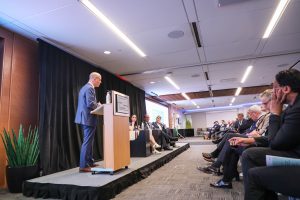 All panelists are worried about the rise of misinformation. We live in a world where the news cycle has accelerated, and media outlets must check and monitor one another. There need to be efforts to support media literacy and local journalism. In the United States, it is evident that Gen Z is on the political left. However, young women are drifting to the left while young men are leaning to the right. Mr. Sattar explained that often economic factors are the driving forces behind the rise of populism. But now, with the case of former President Donald Trump, he does not think that economic factors play a role, but rather, the economy serves as an excuse to support the former President. Ms. Pohl added she finds it interesting that right-wing populists in Europe and the United States are bonding. We are seeing Hungarian Prime Minister Viktor Orbán interacting with Former United States Ambassador to Germany Richard Grenell. She warned that these developments are often underreported and should be more closely monitored. When asked what their predictions are for November’s election, Mr. Sattar said that his prediction fluctuates. Ms. Pohl elaborated that one would think all the lawsuits and charges against former President Trump would make an impact, but it appears they do not, and that worries her. That being said, she is optimistic that President Biden could be reelected. Ms. Meakem stated that she is very fearful that Trump could win because his base is fanatical about him, and there is increasing voter apathy, which could result in fewer individuals voting for President Biden.
All panelists are worried about the rise of misinformation. We live in a world where the news cycle has accelerated, and media outlets must check and monitor one another. There need to be efforts to support media literacy and local journalism. In the United States, it is evident that Gen Z is on the political left. However, young women are drifting to the left while young men are leaning to the right. Mr. Sattar explained that often economic factors are the driving forces behind the rise of populism. But now, with the case of former President Donald Trump, he does not think that economic factors play a role, but rather, the economy serves as an excuse to support the former President. Ms. Pohl added she finds it interesting that right-wing populists in Europe and the United States are bonding. We are seeing Hungarian Prime Minister Viktor Orbán interacting with Former United States Ambassador to Germany Richard Grenell. She warned that these developments are often underreported and should be more closely monitored. When asked what their predictions are for November’s election, Mr. Sattar said that his prediction fluctuates. Ms. Pohl elaborated that one would think all the lawsuits and charges against former President Trump would make an impact, but it appears they do not, and that worries her. That being said, she is optimistic that President Biden could be reelected. Ms. Meakem stated that she is very fearful that Trump could win because his base is fanatical about him, and there is increasing voter apathy, which could result in fewer individuals voting for President Biden.
Guests were invited to continue the conversation during a reception hosted at the AT&T Forum.
The second day of the conference, which was held in the Senate Dirksen Building, was opened by Ambassador John B. Emerson, Chairman of the American Council on Germany. The first panel of the day was entitled, “Political Polarization: What’s at Stake When the U.S. Votes?” and featured Julia Ioffe, Founding Partner and Washington Correspondent of Puck Media; Matt Gorman, Vice President of Targeted Victory; Jamieson Greer, Partner at King & Spalding; and was moderated by Kerstin Kohlenberg, International Reporter of DIE ZEIT. From a European perspective, the reelection of Trump might upend the transatlantic relationship and destabilize the trade, security, and democracy pillars which are cornerstones of the relationship. Mr. Gorman reflected on his time with the Republican base and said that the antipathy towards getting involved in foreign conflicts is very real among Republicans. Trump has accelerated this shift, highlighting involvement in Iraq, Syria, and now Ukraine. The fear of NATO is also very real among Republicans. Ms. Ioffe noted that former President Trump’s promise of ending the war in Ukraine “was bluster.” The former President is arguing that through his relationships he would be able to force through a deal, but the reality is that neither side wants to negotiate. In addition, Trump not supporting Ukraine makes Putin less willing to negotiate. The former President has also openly said things like “NATO is obsolete,” which signals to Putin and Russia that Westerners are soft and corrupt, and its policies and practices fluctuate with each administration. Russia uses this and suggests that that they are waging a war against the West, NATO, and the “hollowness” of it all.
Trade is a major pillar of the transatlantic relationship. Mr. Greer explained that trade policy in the U.S. is very much a domestic matter, but in other countries, it is seen as a tool of foreign policy. He added that under the Trump administration there was historically low inflation. Mr. Gorman explained that while protectionism and trade are significant topics, the larger issues around immigration and abortion will motivate people to go to the polls. Inflation is an issue that is upsetting Biden’s chances of reelection. Republicans are making the case that public spending contributes more to inflation rather than protectionism.
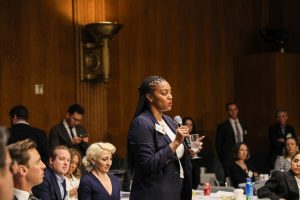
Conference attendee asking a question of the panelist
Looking ahead at possible outcomes for the U.S. election in November, if Trump is reelected and lifts the sanctions on Russia, Ms. Ioffe said there would be a patchwork sanction regime because the EU would not lift their sanctions. Mr. Gorman explained that the previous Trump administration was composed of individuals who were representative of the traditional “old guard” and had come through the Republican National Convention (RNC). In the years since we have seen a shedding of those advisors. Mr. Greer said that the Trump administration was tough on Cuba, Russia, Venezuela, and China, countries that are autocracies or have dictators. He elaborated that Trump’s stance on these countries suggests that if he is reelected, he would not be a dictator. Ms. Ioffe countered that we cannot take the former President’s comments about governing as a “dictator” as flippant and hyperbolic. Other countries and allies are watching what transpires in the U.S. and such commentary sets an example. If America flips to the autocracy column and stops practicing democratic norms, this would be a major ideological win for other dictators like Putin.
The second panel of the day focused on elections on the other side of the Atlantic. In a panel titled “What to Watch When Europe Votes,” a lively discussion between Dr. Phyllis Berry, National Intelligence Officer for Europe at the National Intelligence Council; Christian Gaebel, Head of Agricultural and Support Policy of the Deutscher Bauernverband; Dr. Andrew Moravcsik, Professor of Politics and International Affairs at Princeton University; and Julian Mueller-Kaler, Chief of Staff and Director Strategic Foresight Hub at the Stimson Center. Moderator Claudia Kade, Head of Politics at WELT/WELT AM SONNTAG opened the conversation by posing the question of what to expect in the EU Parliamentary elections. Ms. Berry said that there has been an increasing shift to the right as well as the fragmentation of parties in Parliament. These new parties lead to greater instability and create issues with coalition building. She added that the rise of the Alternative für Deutschland (AfD) stems from some individuals feeling unheard and underrepresented by the government. In eastern Germany, where there is far-right popularity, she said that the eastern German party system is not exactly like the western German party system as the waves of pro vs. anti-government can be more exaggerated in eastern Germany. Germany and Europe have also seen waves of farmer protests, a symptom of losing trust in center political parties. Mr. Gaebel stated that it is crucial to listen to rural areas and bodies and listen to the farmers. He criticized the policy proposals from the EU as they lack impact assessments and welfare and emissions targets.
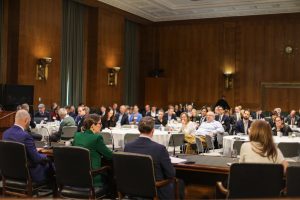 Mr. Mueller-Kaler believes that in Europe we see the perfect storm of crises compounded by crisis. With the war in Ukraine, the European approach had always been to avoid direct confrontation with Russia, but now Europe is changing its tune, especially in the case of French President Emmanuel Macron. There has been a loss of trust and faith in democratic structures, which has resulted in individuals leaning toward the right. However, it is important not to leave populists outside the debate and discussion. If you do this, it emboldens the populist narrative and makes their narrative more powerful. Ms. Berry agreed but also added that not all populists are alike. She said that one tactic to reach a wider audience would be for politicians to explain things more clearly. If the government explains why they are taking certain approaches and why certain policies may be difficult, oftentimes clarification and transparency garner support. Dr. Moravcsik agreed and added there is great differentiation among the far-right. When discussing support for the far-right, Mr. Mueller-Kaler said that times are difficult and the cost of living has substantially increased, so he can understand why people are discontent and upset. Life expectancy has declined for several years, so he’s not shocked that when former President Trump says that he can improve working and living conditions, the working class flocks to support him.
Mr. Mueller-Kaler believes that in Europe we see the perfect storm of crises compounded by crisis. With the war in Ukraine, the European approach had always been to avoid direct confrontation with Russia, but now Europe is changing its tune, especially in the case of French President Emmanuel Macron. There has been a loss of trust and faith in democratic structures, which has resulted in individuals leaning toward the right. However, it is important not to leave populists outside the debate and discussion. If you do this, it emboldens the populist narrative and makes their narrative more powerful. Ms. Berry agreed but also added that not all populists are alike. She said that one tactic to reach a wider audience would be for politicians to explain things more clearly. If the government explains why they are taking certain approaches and why certain policies may be difficult, oftentimes clarification and transparency garner support. Dr. Moravcsik agreed and added there is great differentiation among the far-right. When discussing support for the far-right, Mr. Mueller-Kaler said that times are difficult and the cost of living has substantially increased, so he can understand why people are discontent and upset. Life expectancy has declined for several years, so he’s not shocked that when former President Trump says that he can improve working and living conditions, the working class flocks to support him.
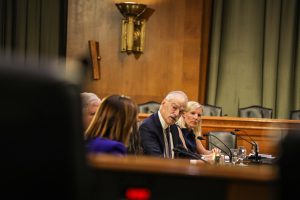
Dr. John Lipksy
In the third panel of the day, entitled “Global Economic (In)Stability,” and moderated by Friederike von Tiesenhausen, Global Head of Public Affairs at Bloomberg LP, the conversation featured some of the brightest economic and financial minds, including Dr. Andreas Dombret, Global Senior Advisor at Oliver Wyman; Claudia Donzelmann, Global Head of Regulatory and Public Affairs of Allianz SE; Dr. Christof Ehrhart, Executive Vice President Corporate Communications and Governmental Affairs of Robert Bosch GmbH; Dr. John Lipsky, Senior Fellow at the Foreign Policy Institute at Johns Hopkins University School of Advanced International Studies (SAIS) and ACG Board Member; and Dr. Inu Manak, Fellow for Trade Policy at the Council on Foreign Relations. Dr. Lipsky explained that the U.S. economy has seen a big weakening of the equity market and a strong rise in long-term interest rates. But the market consensus has changed substantially over the past few months. More recently, consumer price index numbers have led to a reassessment of how quickly inflation would recede in the context of expected growth. The IMF has used the term “overheating” to suggest that there may be a future problem. Interest rates may not be coming down as far as previously expected. Dr. Lipsky added that the current combination of fiscal and monetary policies will not produce a desirable outcome without further adjustment.
Dr. Dombret countered by explaining that Europe is confronted with different crises, including the Covid-19 pandemic and supply chain shocks. The real issues lie at the heart of the redistribution fights between countries, in addition to the fact that the U.S. economy is two times larger than other advanced countries, and the Eurozone has very low productivity. Dr. Manak added that the underlying trade tensions between the U.S. and Europe have not disappeared. That being said, she describes the transatlantic economy as “shaken, not stirred,” and the economic figures remain strong. Although communication is open, we have yet to see anything concrete emerge from the US-EU Trade and Technology Council (TTC). She highlighted that the TTC could be a valuable tool in fostering closer relations between the U.S. and the EU.
Given the increasingly uncertain geopolitical situation, Ms. Donzelmann said that in order to navigate this environment, companies need to develop strategic scenario analysis and build operational resilience with volatility assumptions. If a scenario is rapidly changing, what are the triggers and what are the capital buffers that are in place? Dr. Ehrhart echoed this sentiment by adding that if the 20th century was a century of “project management,” the 21st century is “dealing with a dilemma.” Today’s business dealings are more global than ever, and when we talk about concepts like “de-risking” and “decoupling,” they have rapid and dramatic economic implications. Similarly, Dr. Manak said that given that the U.S. is moving to decouple from China, India is beginning to attract significant investment. That being said, there are major obstacles in India, including demographic challenges and its regulatory environment.
In comparing the business environments between Germany and the U.S., Dr. Dombret explained that Germany has a huge problem with its investment strategy and its investment climate. In Germany, regulatory red tape is an overarching issue, and there is a lack of awareness that public investment is not negative but can also compliment private investment. Ms. Donzelmann noted that venture capital is much larger in the U.S. There are several innovative technology and AI companies and start-ups in Germany, but they lack financing. This results in a brain drain, as many of these ideas and initiatives take root in the U.S. Ms. von Tiesenhausen posed the question of what should be done to produce global economic order, and the panelists agreed that there needs to be a commitment to a multilateral system. The system that was put in place following World War II had the goal of liberalizing trade to drive growth. Many of these international bodies have lost their value and importance, and we need to make sure that institutional governance reflects today’s economic reality rather than a political battlefield.
The ongoing Israel-Hamas war in Gaza has caused both regional and global escalation. Bradley Bowman, Senior Director of the Center on Military and Political Power at the Foundation for Defense of Democracies; Dr. Charles Kupchan, Senior Fellow at the Council on Foreign Relations and ACG Board Member; and Dr. Norbert Röttgen, Member of the Bundestag (CDU); and moderator Julia Friedlander, CEO of Atlantik- Brücke provided insight into the domestic and foreign policy implications of the division in the Middle East. Mr. Bowman said that the Hamas terrorist attack on October 7 was a combination of 9/11 and Pearl Harbor in terms of psychological shock and shattering fundamental expectations for Israel. The assumptions and indicators that Hamas was going to attack were completely missed, and the Israel Defense Forces (IDF) failed. He added that it’s in America’s interest to help Israel defend itself. Dr. Kupchan agreed that one should not underestimate the degree to which October 7 psychologically hurt Israel. There was this sense that prior to October 7, Israel was becoming a normal, bustling country, and since the attack, that sense of normalcy has completely disappeared. He completely sympathizes with Israel’s right to defend itself, but it is important to direct some criticism and he has difficulty understanding the lack of humanitarian support. Dr. Röttgen was completely stunned by the attack, and he believes the fundamental trust of Israelis in the Israeli state is broken. Israel is tragically trapped, and what has unfolded to this day falls in Iran and Hamas’ handbook. By forcing Israel to defend itself, Israel is at the same time undermining its long-term security prospect of trying to find peace with the Arab world.
Dr. Kupchan said that just as Al Qaeda wanted the U.S. to retaliate in Afghanistan, Hamas wanted Israel to respond. That does not mean that Israel should continue to retaliate as it is, but where does the story end? How do we get back to where we were? When asked by Ms. Friedlander if President Biden should have responded differently, Dr. Kupchan added that Biden handled it correctly because the private conversations between himself and Prime Minister Benjamin Netanyahu were not working, and now, Biden has gone more public. While standing by Israel, the administration can do more, especially considering humanitarian aid. Dr. Röttgen said that President Biden has handled the war in Gaza in a balanced way as the U.S. has to support Israel but added that sometimes a president has to pay in an electoral way to be on the right side of history. Dr. Kupchan agreed and said that President Biden must do the right thing, even if there are domestic political costs. Mr. Bowman believes that we need to be clear about where this ends and to have strategic empathy, while avoiding a regional war. On this front, deterrence needs to be restored.
In the final session of the day, Deborah Düring, Member of the Bundestag (Greens); Dr. Evelyn Farkas, Executive Director of the McCain Institute; and Ambassador Jovita Neliupšienė, EU Ambassador to the U.S., with moderator Terrell Jermaine Starr, Founder and Host of Black Diplomats discussed public perceptions of the war in Ukraine.
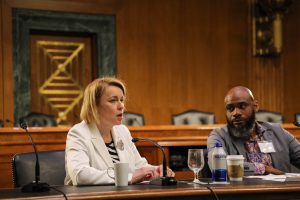
Ambassador Jovita Neliupšienė, EU Ambassador to the U.S, and Terrrell Jermaine Starr, Host of Black Diplomats
Ambassador Neliupšienė emphasized how vital it is to support Ukraine and combat Russian aggression. President Putin is challenging the rules-based order, and if we do not stop him now, he will continue through Europe. President Putin’s worrisome influence cannot be stressed enough. Dr. Farkas elaborated that Hamas terrorists are a proxy of Iran and Iran is an ally of Russia. The beneficiary of the crises and turmoil which we are facing is President Putin. All conflicts are interconnected, and we are the closest to World War III since the Cuban Missile Crisis. Ms. Düring agreed and said that Germany underestimated Russia despite how clear Putin was with his messaging. She highlighted that her party, the Green Party, supports both humanitarian and military aid. The shift in party view to support military aid derives from how victory in Ukraine means freedom for the world. The invasion of Ukraine shook Ms. Düring to her core, given the proximity of Ukraine to Germany. Ambassador Neliupšienė noted that there is unjust criticism against Germany, but Germany is the largest supporter of Ukraine. Although Europe does not have a military alliance, the way in which it was able to mobilize and provide Ukraine with eleven billion euros of aid is incredible. Such efforts underscore how necessary it is to unify and address issues together in today’s global war arena.
When asked by Mr. Starr why Americans should care and understand NATO, Dr. Farkas added that a political and ideological alliance with Europe ensures American prosperity. If we want to have shared security and to maintain our democratic way of life, the U.S. cannot live in isolation. Ambassador Neliupšienė clarified that victory in Ukraine can only be defined by President Zelenskyy because Ukrainians will fight to the end to secure their territory. Dr. Farkas added that she condemns the narrative that some Republican politicians are peddling that Ukraine is losing. Ukraine is only weakened if we don’t provide support and aid. Dr. Farkas explained that she does not understand the attraction to hardline autocrats like Russian President Vladimir Putin and Hungarian Prime Minister Viktor Orbán. However, when one thinks of former President Trump, he feels very comfortable in a male-dominated space where there is sexism. Money appeals to Trump because for decades he was receiving money from other strongmen. In other words, these autocrats benefit from each other.
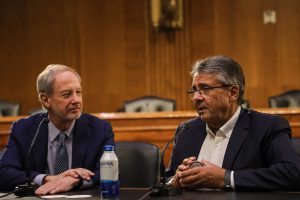
Ambassador John Emerson and Sigmar Gabriel
To conclude the conference, John B. Emerson, ACG Chairman, and Sigmar Gabriel, Chairman of Atlantik-Brücke, shared some thoughts and conclusions. Mr. Gabriel said that under the Trump administration, there was little to no respect for allies and the priority was only to fulfill the agenda of President Trump. As such, November’s U.S. election is not only important for the U.S. but also for the rest of the world. Ambassador Emerson added that we are too far out to even predict who will win November’s election, but several factors will be impactful, one of which is the role of swing states. There are also numerous “known unknowns.” The first is the state of the economy, followed by the ongoing wars and the legal predicament that Trump is in. If former President Trump wants to win, then he also needs to focus on the American people rather than himself. Another factor will be the role of third-party candidates such as Robert F. Kennedy Jr. (RFK) and the issues that mobilize voters to the polls, like immigration and abortion. Ultimately, November’s elections are incredibly crucial, but there are too many moving parts and several dynamics that could develop over the course of the next several months. Regardless of the outcome of November’s election, the American Council on Germany and Atlantik-Brücke will be vital in continuing the transatlantic dialogue.


